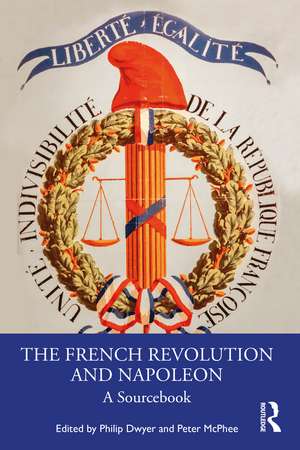The French Revolution and Napoleon: A Sourcebook
Editat de Philip Dwyer, Peter McPheeen Limba Engleză Paperback – 25 iun 2024
The achievements, terror and drama of the French Revolutionary and Napoleonic period restructured politics and society on a grand scale, making this the defining moment for modern European history. While bringing the impact of historical events to life, Philip Dwyer and Peter McPhee provide a clear outline of the period through the selection of key documents, lucid introductory passages and commentary. They illustrate the meaning of the Revolution for peasants, sans- culottes, women and slaves, as well as placing events within a wider European and global context.
Students will find this an invaluable source of information on the Revolution and its international significance.
| Toate formatele și edițiile | Preț | Express |
|---|---|---|
| Paperback (1) | 296.55 lei 3-5 săpt. | +23.40 lei 6-12 zile |
| Taylor & Francis – 25 iun 2024 | 296.55 lei 3-5 săpt. | +23.40 lei 6-12 zile |
| Hardback (2) | 764.91 lei 6-8 săpt. | |
| Taylor & Francis – 25 iul 2002 | 764.91 lei 6-8 săpt. | |
| Taylor & Francis – 25 iun 2024 | 1011.99 lei 6-8 săpt. |
Preț: 296.55 lei
Nou
Puncte Express: 445
Preț estimativ în valută:
56.75€ • 60.68$ • 47.31£
56.75€ • 60.68$ • 47.31£
Carte disponibilă
Livrare economică 27 martie-10 aprilie
Livrare express 12-18 martie pentru 33.39 lei
Preluare comenzi: 021 569.72.76
Specificații
ISBN-13: 9781032618791
ISBN-10: 1032618795
Pagini: 338
Ilustrații: 44
Dimensiuni: 156 x 234 x 22 mm
Greutate: 0.47 kg
Ediția:2
Editura: Taylor & Francis
Colecția Routledge
Locul publicării:Oxford, United Kingdom
ISBN-10: 1032618795
Pagini: 338
Ilustrații: 44
Dimensiuni: 156 x 234 x 22 mm
Greutate: 0.47 kg
Ediția:2
Editura: Taylor & Francis
Colecția Routledge
Locul publicării:Oxford, United Kingdom
Public țintă
AS/A2, Undergraduate Advanced, and Undergraduate CoreCuprins
1. The Ancien Régime Challenged 2. Revolutionary Action 3. Creating a Regenerated France 4. Exclusions and Inclusions 5. The Church and the Revolutionary State 6. International Reactions to the Revolution 7. Monarchy and Revolution 8. The Revolution At War 9. The End of the Monarchy 10. The Peasantry and the Rural Environment 11. Debating Women’s Role in the Revolution 12. A New Civic Culture 13. The Republic at War 14. Revolt in the Vendée 15. Slavery and Emancipation 16. 'The Terror' at Work 17. The Thermidorian Reaction 18. The Directory 19. The Rise of Napoleon 20. Law and Order 21. God, the People, and the Empire 22. Governing the Empire 23. The Experience of Warfare 24. Living Under the Empire 25. Resistance and Repression 26. The Russian Catastrophe 27. The Anti-Napoleon 28. Collapse 29. The Hundred Days 30. Reflecting on Revolution and Empire
Notă biografică
Philip Dwyer is Professor of History and founding Director of the Centre for the Study of Violence at the University of Newcastle, Australia. His books include Napoleon: The Path to Power (2008); Citizen Emperor: Napoleon in Power (2013); and Napoleon: Passion, Death and Resurrection, 1815–1840 (2018). He is co-editor of The Cambridge History of the Napoleonic Wars (2022). He is currently writing a global history of human violence.
Peter McPhee is Emeritus Professor of History at the University of Melbourne, Australia. His books include Living the French Revolution 1789–1799 (2006); Robespierre: a Revolutionary Life (2012); and Liberty or Death. The French Revolution 1789–1799 (2016). He is currently working on a book on the history of the French landscape 1770–2020.
Peter McPhee is Emeritus Professor of History at the University of Melbourne, Australia. His books include Living the French Revolution 1789–1799 (2006); Robespierre: a Revolutionary Life (2012); and Liberty or Death. The French Revolution 1789–1799 (2016). He is currently working on a book on the history of the French landscape 1770–2020.
Descriere
This volume collects together a wide selection of primary texts that explain the processes behind the enormous changes undergone by France and Europe between 1787 and 1815, from ‘the Terror’ to the counter-revolution and from Marie-Antoinette to Bonaparte.
